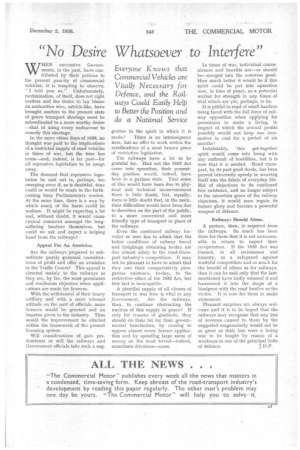Whatsoever to Interfere"
Page 41

If you've noticed an error in this article please click here to report it so we can fix it.
gestion in the spirit in which it is made? There is no intransigence here, but an offer to work within the ramifications of a most brazen piece of restrictive legislation.
The railways have a lot to be grateful for. Had not the 1933 Act come into operation, their presentday position would, indeed, have been in a parlous state. That some of this would have been due to physical and technical inconveniences there is little doubt, but, equally, there is little doubt that, in the main, their difficulties would have been due to desertion on the part of the public, to a more convenient and more friendly type of transport in place of the railways.
Even the confirmed railway traveller or user has to admit that the better conditions of railway travel and freightage obtaining to-day are due almost solely to the road-transport industry's competition. It may not be pleasant to have to admit that they owe their comparatively prosperous existence, to-day, to the restrictive effect of the 1933 Act, but this fact is inescapable.
A plentiful supply of all classes of transport in war time is vital to any ,Government. Are the railways, then, to continue obstructing the nucleus of this supply in peace? If only for reasons of gratitude, they should do their bit for their governmental benefactors, by ceasing to oppose almost every licence application and by spending large sums of money on the most trivial—indeed, sometimes frivolous—cases. In times of war, individual conveniences and benefits are—or should be—merged into the common good. How much better it would be if this spirit could be put into operation now, in time of peace, as a potential worker for strength in any times of trial which are yet, perhaps, to be.
It is pitiful to read of small hauliers being faced with the full force of railway opposition when applying for permission to make a living, in respect of Which the annual profits possibly would not keep one locomotive in coal for a period of six months !
Indabitably, 'this get-together, spirit would come into being with any outbreak of hostilities, but it is now that it is needed. Road trans-, port, by its past good deeds, has been proved inherently speedy in weaving itself into the fabric of everyday life. Rid of objections to its continued free existence, and no longer, subject to the uncertain grace of the railway objectors, it would soon regain its former glory and become a powerful weapon of defence.
Railways Should Atone.
A gesture, then, is required from the railways. So much has been done for them that it is not unreasonable in return to expect their co-operation. If the 1933 Act was framed, in all seriousness and honesty, as a safeguard against wasteful competition and as much for the benefit of others as for railways, then it can be said only that the lastmentioned have badly misused it and hammered it into the shape of a bludgeon with the road haulier as the victim. It is now for them to make atonement.
Pleasant surprises are always welcome and it is to be hoped that the railways may recognize that any loss of revenue caused to them by the suggested magnanimity would not be so great as their loss were a losing war to be fought by reason of a weakness in one of the principal links
of defence. J.D.P.




























































































